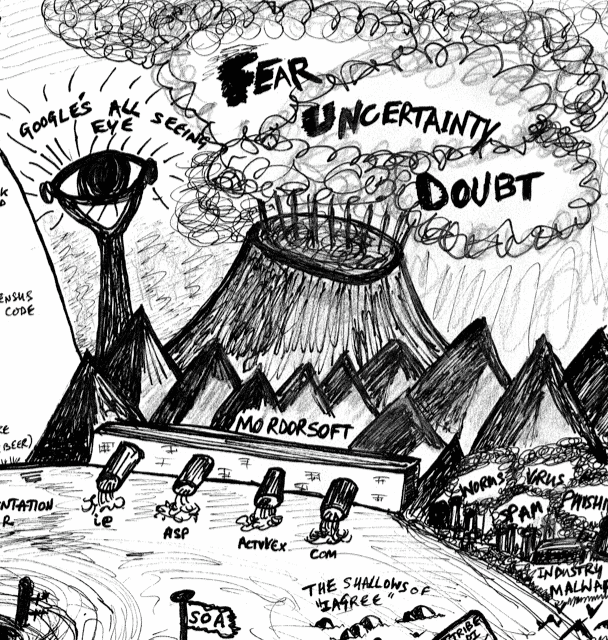Much as we may want to deny it, people can, and do, live without the faintest notion of the nature of technology. They may use technology and its products; but, by no stretch of the imagination could they be described as knowledgeable consumers of technology. – Technological Literacy Reconsidered”Journal of Technology Education 2013″ – Walter B. Waetjen
When I was a teenager I was a volunteer for a local church program that was offering basic computer education to under and unemployed people in our community. We had a small computer lab of 8 desktops that I built and a course that matched the local Community College’s Computerized Business Applications 101 course. This was one of the first comments I heard as the students came to class for the first time.
“I don’t know how to use a mouse. I’m afraid that I’ll break that thing if I touch it!”
Overcoming Technology Phobia

To say that the students of my class were all “characters” would be like calling Mardi-gras a little quiet costumed get together.
No one in the class was under 40 years old, and most of them had been to rehab at least once in their life, if not in the past 2 years. Regardless they were beaming with enthusiasm at the opportunity that learning how to use computers might bring and yet at the same time a sense of haunted dread seemed to tug at the corners of their eyes when I started telling them about the curriculum we had developed.
Being a Digital Native vs. Being a Technological Castaway

“How many of you have used a computer at all in the past month? ” I asked. No one raised their hand. I was blown away, the idea that none of them had used a computer even in the last month when I was using mine to play Starcraft and Final Fantasy 11 online every single day was completely foreign concept. I had taken a computer class in school in first grade!
“How many of you have really used a computer on a regular basis before?” One of the eight students meekly raised his hand. When I asked “What did you do with that computer?”I got a surprising answer.
“I helped load the punch cards for a computer at an old job I had in my twenties!”
Smiling a little bit I let him know that things had changed a bit since then but we’d take it one step at a time. Of course, I didn’t realize how small those first steps would need to be.
Digital Self-Doubt
I could see the irrational fear in her eyes as I asked to class to turn on their computers and to click on the icon on the desktop for Microsoft Word.
While everyone else had put their hands on their mouse, she had picked it up and was looking at it like it might bite her. That’s when she took a deep breath and told me the truth. She really truly didn’t know how to use a mouse.
I had her take a deep breath before having her put the mouse down and put my hand over hers to show her how it moved the cursor on the screen, and that left clicking did actions and right clicking gave options. After a week of coming to class and practicing you couldn’t have guessed that she didn’t know how to use a mouse.
It Is Not Going to Explode
When I told the class that this would be the first time they were going to change the computer settings for the monitor display they gave me blank and stunned stares.
“I don’t think I can do that…I’m sure that I’m going to break it on accident!” one student said. I then gave them an exercise to make them understand that they couldn’t do just that.
“I’d like you to press every button on the keyboard, and click everything you can think of to make the computer break short of bashing it with a hammer.” After a while the nervous chitters turned to laughs as they dragged icons around, opened folders, typed gibberish, and changed the screen resolution but no one was able to destroy their computer.
After that they went to the tasks we gave them with a little less fear and hesitation.
Looking Back to Move Forward
For the final at the end of the class they all emailed me a word document, an excel spreadsheet, and a powerpoint presentation. I can still remember the proud glow of accomplishment they had on their faces when I reminded them of how far they’d come from that first day.
I was ecstatic when I got a call several weeks later from a potential employer actually checking on one of my student’s resume references and was overjoyed to able to tell them that they she was proficient in basic Microsoft Office and would make a great addition as a receptionist.
Techno-Phobia and Small Business
While I was still teaching that class I started working with a real estate website hosting company as online customer support for their websites. We offered full website assistance as long as they had us on the line. To my horror, I found that many of the people I was talking to who were selling million dollar homes had as much technical skill as the students at my school.
From the concerned Realtor who couldn’t figure out where the letter went in her scanner that she wanted to “email” us to the guy who printed out his website, wrote down changes and mailed it to us. Whole pages of handwritten content he wanted added to his site. It wasn’t that these people weren’t intelligent, clever or talented. It was that they had worked in a world of paperwork, literal paper work and hadn’t kept up with the relentless march of technology.
Resolving Techno-Babble Problem
Remember each step needs to be explained in real English, not techno speak . Make each step small and clear, don’t assume they know a single thing.
During my tenure as a customer support rep basically for a website, I learned that a lot of the battle was in the day to day terminology that I had become so used to that I didn’t even realize that people might not be familiar with these terms. I often find myself explaining just what those three letters mean let alone our understanding of Google’s algorithm. But that’s part of our job, explaining complex technical elements to others who may not share our same level of expertise.
Overcoming the Technological Literacy Gap
Here some concrete ideas on where we can start to make changes to our own thoughts and processes to actually help the situation:
- When you’re faced with a person who is not familiar with these terms, it’s very easy to make them feel inadequate if you’re constantly stopping to spell it out. Instead, use simple practical vocabulary and don’t just drop in technical terms expecting them to be understood wholesale.
- Break down larger abstract concepts into more concrete smaller pieces.
- Be patient and don’t be condescending. They likely have far more experience in other topics that would leave you scratching your head, so be polite.
- Metaphors are Rosetta Stones, they can help translate complex ideas into understandable elements.
Do You Have A Techno-Illiteracy Story?
Have you run into a situation where a high level executive or business owner you’re trying to work with shows a complete lack of technical skills? Please share your story and what it took to overcome the gap!